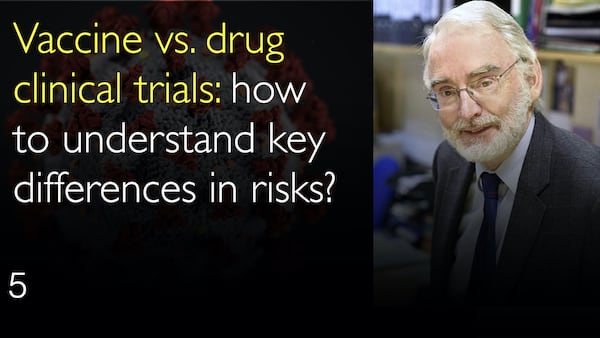Dr. Stephen Evans, MD, en førende ekspert inden for kliniske forsøgsanalyser og farmakovigilans, forklarer de centrale forskelle mellem vaccine- og lægemiddelforsøg. Han belyser, hvordan vacciner testes på store grupper af raske personer, herunder børn, og understreger det afgørende fokus på minimal skade samt brugen af immunogenicitet som et surrogatudfald. Dette står i kontrast til lægemiddelforsøg, som typisk involverer ældre, sygere patienter og oftere måler sygdomsrelaterede udfald.
Vigtige forskelle mellem vaccine- og lægemiddelundersøgelser: Sikkerhed og design
Spring til afsnit
- Vaccineundersøgelser i raske populationer
- Måling af vaccineeffektivitetsudfald
- Immunogenicitet som surrogatendepunkt
- Krav til store udvalgsstørrelser
- Patientpopulationer i lægemiddelundersøgelser
- Tolerabilitet af bivirkninger
- Fuld transskription
Vaccineundersøgelser i raske populationer
Dr. Stephen Evans, MD, fremhæver en grundlæggende forskel i designet af kliniske undersøgelser. Vaccineundersøgelser udføres primært på raske personer, ofte inklusive raske børn. Målet er at give beskyttelse mod en fremtidig sygdom med minimal risiko.
Sikkerhedskravene er exceptionelt høje, da indgrebet gives til personer, der ikke er syge. Almindelige, mindre bivirkninger omfatter lokaliseret udslæt eller ømhed på injektionsstedet. Det etiske krav er at undgå at forårsage signifikant skade på raske personer.
Måling af vaccineeffektivitetsudfald
Dr. Stephen Evans, MD, forklarer udfordringen ved at måle en vaccines sande effektivitet. Vacciner har til formål at forebygge en sygdom, der ofte er relativt sjælden i populationen. Denne sjældenhed gør det vanskeligt at designe en undersøgelse, der direkte kan påvise en reduktion i sygdomsforekomst inden for en overskuelig tidsramme og med et begrænset antal deltagere.
Derfor er forsøgsledere ofte nødt til at stole på alternative, målbare udfald, der fungerer som proxy for at bevise vaccinens effektivitet i den virkelige verden. Dette adskiller sig markant fra mange lægemiddelundersøgelser, der fokuserer på behandling af en eksisterende, aktiv diagnose.
Immunogenicitet som surrogatendepunkt
En afgørende metode til evaluering af vacciner er måling af immunogenicitet. Dr. Stephen Evans, MD, definerer dette som kroppens evne til at producere specifikke antistoffer mod målvirussen eller patogenet. Et stærkt antistofsvar betragtes som et pålideligt surrogat for beskyttelse.
Denne type evidens er normalt afgørende for regulatorisk godkendelse, da den indikerer, at vaccinen har "trænet" immunsystemet med succes. Denne tilgang er nødvendig, når det faktiske sygdomsudfald er for sjældent til at kunne måles direkte i en undersøgelse.
Krav til store udvalgsstørrelser
Behovet for at opdage sjældne bivirkninger og anvende surrogatendepunkter kræver meget store undersøgelser. Dr. Stephen Evans, MD, bemærker, at vaccineundersøgelser kræver enorme deltagerantal for at opnå tilstrækkelig statistisk styrke til at identificere selv meget ualmindelige bivirkninger.
At finde disse sjældne sikkerhedssignaler er afgørende, når et produkt gives til millioner af raske mennesker. Store udvalgsstørrelser sikrer, at fordel-risikoprofilen er grundigt forstået, før produktet anvendes bredt.
Patientpopulationer i lægemiddelundersøgelser
Dr. Stephen Evans, MD, sammenligner vaccineundersøgelser med dem for terapeutiske lægemidler. Lægemiddelundersøgelser inkluderer typisk ældre patienter, der allerede har en diagnosticeret sygdom eller tilstand. Deltagerne er syge, og lægemidlet er beregnet til at behandle deres sygdom eller lindre symptomer.
Forekomsten af det undersøgte sygdomsudfald er ofte højere end den sygdom, en vaccine forebygger. Dette kan undertiden tillade mindre undersøgelsesstørrelser sammenlignet med vaccinestudier. Forebyggende lægemidler som statiner kræver dog også store undersøgelser for at måle sjældne hændelser som hjerteanfald.
Tolerabilitet af bivirkninger
Tolerabiliteten af bivirkninger afviger markant mellem disse to undersøgelsestyper. Dr. Stephen Evans, MD, påpeger, at raske mennesker ikke vil acceptere bivirkninger let. En mindre bivirkning i en lægemiddelundersøgelse kan være acceptabel, hvis den afvejes mod behandling af en alvorlig sygdom.
Den samme bivirkning i en vaccine til en rask person kan anses for uacceptabel. Risiko-fordi-beregningen er helt anderledes. Interviewet med Dr. Anton Titov, MD, understreger, at sikkerhed er det afgørende anliggende i enhver klinisk undersøgelse, der involverer raske populationer.
Fuld transskription
Dr. Anton Titov, MD: Professor Evans, hvad er forskellen mellem undersøgelser for vacciner og kliniske undersøgelser for lægemidler? De er ekspert i klinisk undersøgelsesanalyse og især overvågning af bivirkninger ved lægemidler, der allerede er på markedet. Så hvordan skelner De mellem gennemførelsen af kliniske undersøgelser for vacciner og lægemidler?
Dr. Stephen Evans, MD: Der er to eller tre ting, der gør vaccineundersøgelser anderledes. For det første, som jeg allerede har nævnt, gives vacciner typisk til raske mennesker. Meget ofte gives de til raske børn. Man ønsker bestemt ikke at give raske børn bivirkninger, så man søger at opnå fordele med meget minimale skader. Vi stræber ikke efter nul skade.
Hvis man giver en vaccine, kan man let få udslæt eller øm arm, og det er en bivirkning af vaccinen. Lejlighedsvis forårsager de mere alvorlige skader, og man skal sikre sig, at disse skader undgås. Men udfordringen er, at vacciner gives for at forebygge en sygdom, så man skal sikre sig, at de virker.
Meget ofte er sygdommen i sig selv ret sjælden, så man kan ikke altid være absolut sikker på, at de forebygger sygdommen. Man må måle en anden type udfald. Man måler ofte, hvad der kaldes immunogenicitet i en vaccine, hvilket er kroppens evne til at producere antistoffer mod sygdommen eller virussen, som man forsøger at forhindre i at forvolde signifikant skade på mennesker.
I stedet for at demonstrere direkte, at man forebygger sygdommen, viser man, at kroppen har antistoffer mod den sygdom. Det er normalt ret overbevisende. Selv da har man ofte brug for meget store deltagerantal.
De afgørende punkter er: vi har brug for store tal i vaccineundersøgelser, vi giver dem til raske mennesker, vi kan kun tolerere meget få bivirkninger, og nogle gange er det svært at måle udfaldet direkte. For lægemidler, hvor vi ofte giver dem som behandling til mennesker, gives de typisk til ældre mennesker. Vi giver ikke nødvendigvis lægemidler til børn; vi giver dem til mennesker med sygdomme.
Forekomsten af sygdommen eller det udfald, man er interesseret i, er ofte tilstrækkelig hyppig, så man ikke har brug for lige så store undersøgelser. For eksempel med undersøgelser af statiner, hvor man giver dem til mennesker for at forebygge hjerteanfald eller død, har man brug for større undersøgelser. Raske mennesker vil ikke tolerere bivirkninger nær så let.




